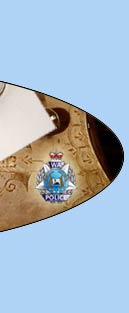 |
 |
 |
||
 |
||||
 |
 |
 |
||
 |
 |
 |
||
 |
||||
 |
 |
 |
||
|
|
|
West Australian Police Officers of Renown
William Henry TIMPERLEY Timperley was almost certainly the direct descendant in the male line of a famous family of English landed gentry of Hintlesham Hall, Ipswich, County Suffolk. By the late 1600s one branch of the family had established itself around Manchester, in Lancashire. The proven descent of this Timperley line runs as follows: John Timperley, married Anne Ogden in 1712, died in Manchester 23/1/1766. Their son was: John Timperley, born at Blackley, Lancashire, 20/3/1724 or 1725, died 29/10/1793. Married (name unknown). Their son was: John Timperley (his brother Thomas was described as a 'gentleman of Manchester'), born at Blackley, Lancashire 8/3/1761, married Elizabeth Postles at Manchester Cathedral, 23/4/1789. Their son was: The Reverend William Thomas Postles Timperley (1807-1881), a Chaplain in the British Army, who married Elizabeth Bradney Evans in 1832. Their oldest son was the subject of this sketch - William Henry Timperley. The family arrived in Western Australia in 1851, but there was scandal in the air, for Rev.Timperley arrived in the colony in the company of the pregnant wife of retired army officer Major Kingsmill Pennefather. He had to make some awkward explanations to the Archdeacon of Perth, and even though things were smoothed over when Pennefather himself arrived in the colony, reputations were unfairly damaged.
In considering William Henry Timperley's career it is therefore important to remember he was from a very distinguished family of English gentry with a strong service tradition. The police officer emulated his family and became one of WA's leading colonial citizens. William Henry Timperley married Rebecca Properjohn at Bunbury on 2/11/1858. The couple had ten children. One son, Percy Oughton Timperley became a police officer and later a Clerk of Courts and Registrar. The youngest son, Lewis Clayton Timperley (1879-1946), was a committed military man and served as a Major and 2nd in command of the 10th Light Horse Regiment in World War 1. This man's son Richard Henry Timperley (born 1922) was a soldier in turn and served against the Japanese in New Guinea and Borneo in World War 11. After the war, he was at one time a Major in the Australian Regular Army, then followed other careers as a journalist, businessman and author. William Henry Timperley eked out a living in the 1850s taking odd jobs from farmers around York and Toodyay before deciding to join the Police Force. The triumphs and tribulations of his policing career are well outlined in M.Bentley's 'Grandfather was a Policeman' and in R.H. Timperley's book 'Heroes Galore'. Promotions Towards the end of his police career, when he was in Perth for some reason in August 1883, he visited Rottnest Island and aided in compiling an adverse report on the health conditions of Aboriginal prisoners. Resigned: 1/8/1885, or rather was transferred to another Governnment position - from that date he was Superintendent of Rottnest Island. Timperley served as Superintendent of Rottnest 1885-1890, then as Resident Magistrate at Bunbury, 1890-1904. He presided over the Wellington District and two others - in fact, most of the south-west. After retiring, he was made a Companion of the Imperial Service Order in 1905. During his time in WA he was active in the Mechanic's Institute and was a freemason - he reached the rank of Grand Warden of the Masonic Lodge of WA. Inevitably, he was also a leading member of the Weld Club. Timperley had broad intellectual interests. He had a great passion for classical music and founded the Bunbury Orchestral Society. Timperley was much in demand as a public lecturer in later life and he gave learned papers on anthropology and other subjects. He also had two novels for young people published - 'Harry Treverton' and 'Bush Luck', while his private papers and journals have been preserved by the Battye Library. Died: at South Perth on 11/8/1909. Peter Conole |
|
|